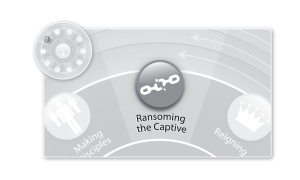 There’s one particular Scriptural insight about sin that will prove to be crucial in our understanding and carrying out the Work of Mercy of ransoming the captive:
There’s one particular Scriptural insight about sin that will prove to be crucial in our understanding and carrying out the Work of Mercy of ransoming the captive:
Sin, even when forgiven, does not disappear.
This is a subject about which we’ve written before, so please take a quick second to click over to this previous post and read it through before continuing on. (Go ahead. I’ll wait.)
OK, done? Then let’s continue.
Here’s the relevance of this whole idea to the subject of ransoming the captive:
Ransoming the captive isn’t just a metaphor for setting people free from whatever binds them. The reason why is that what binds people doesn’t just disappear–*poof!*–into thin air when people are set free. It has to go somewhere and be borne by someone.
No modern author has illustrated this truth better than Walter Wangerin in his achingly beautiful short story, The Ragman. Please make sure to click that link, too. It’ll be worth your quick read.
But there’s another aspect of the Ragman tale and, more importantly, another set of Scriptures related to the subject of sin not disappearing that is awfully central to this Work of Mercy of ransoming the captive. You can see it in Scriptures like 2 Corinthians 4:10 and Colossians 1:24. (Yep, more clicking. Please–by all means–click away. I’ve got all day. Really.) They remind us that while only Christ’s suffering is salvific, our suffering–our serving as a ransom–is one of the key ways Christ draws the world’s attention back to the only suffering that ultimately changes anything, i.e., his own. In his masterful Blood of the Martyrs (yep, please click on that one, too), theologian Nathan Pitchford puts it like this:
Christ had to suffer in order to purchase our eternal life; and now we as his witnesses have to suffer in order to spread the effects of that fully-accomplished redemption… By God’s design, the blood of his Son is the only source of life for the Church; but… [i]t is the blood of the martyrs that gives an undeniably powerful testimony of the truth of Christ’s life, joy, and peace, operative no matter how adverse the circumstances.
That’s why ransoming the captive can’t simply be about helping people stop smoking or chewing their nails (or smoking their nails, for that matter):
Because it is in our serving as a ransom–our willingness to bear the cost, pain, and loss racked up by others or on others, in Jesus’ name–that Christ’s serving as a ransom is mirrored into the world, and people are forced to reckon with it again.
Consider, for example, Stephen in Acts 6 and 7. (Clickety click. Linkety link. We have a lot of ground to cover. Don’t skip over the links or we’ll fall in holes of misunderstanding.)
Ransoming the captive, in other words, is going to cost more than Christ.
It’s going to cost you, too.
Better scroll back up and click on that Ragman link so you can see what you’re getting into.










